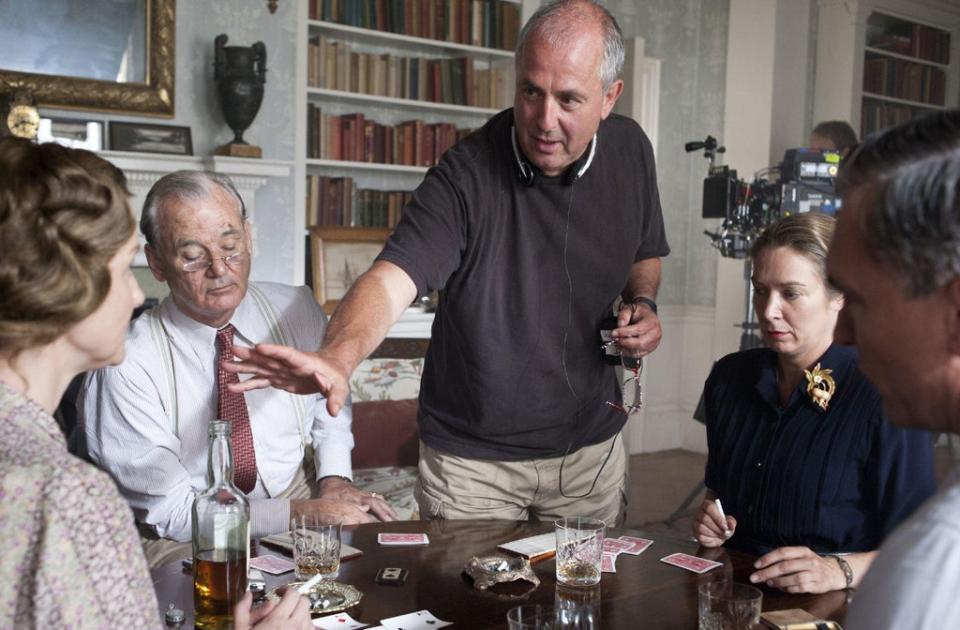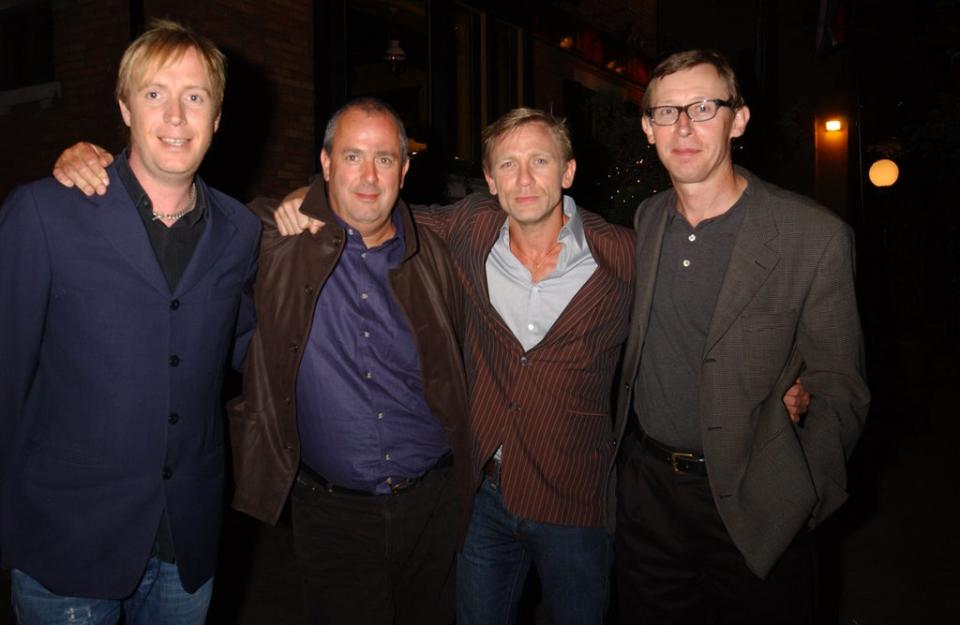Roger Michell: Prolific director behind ‘Notting Hill’

Good fortune shone on Roger Michell when Mike Newell turned down the chance to direct the 1999 film Notting Hill, having five years earlier made the writer Richard Curtis’s previous romcom, Four Weddings and a Funeral.
Michell, who has died unexpectedly aged 65, took on the role after making his mark as a director first on stage with the Royal Shakespeare Company, then on television with the culture-clash drama series The Buddha of Suburbia (1993) and a naturalistic feature-length version of Jane Austen’s Persuasion (1995).
With Notting Hill, he brought to the screen an Englishness that would permeate in different ways throughout many of his films.
Hugh Grant, the floppy-haired star of Four Weddings and a Funeral, returned to the Curtis fold – as he would again later – in the role of the divorced bookshop owner falling for Julia Roberts’s American film star.
The comedy comes from the effect a relationship with someone famous has on both him and his friends, who were played by a fine ensemble of British actors – Emma Chambers as Grant’s wacky younger sister, Rhys Ifans as his flatmate, Tim McInnerny as his best friend, Gina McKee as the friend’s paraplegic lawyer wife, and Hugh Bonneville as an incompetent stockbroker friend.
Not only did Notting Hill become the best-performing film at the British box office in 1999, but it was also superior to Four Weddings and a Funeral with its “moments of truth”, as American critic Roger Ebert described them. One is when Roberts looks at the camera and says: “One day, my looks will go and I'll be a sad, middle-aged woman who looks like someone who was famous for a while.”
Alongside bringing his own mantra of “truth” to filmmaking, Michell had the logistical challenge of shooting on the real Notting Hill locations in west London – where Curtis lived – among the market traders, shop owners and residents.
Initially concerned that the streets would be “gridlocked” with onlookers and paparazzi, he grew to feel that locals were “genuinely excited” about their area being celebrated on screen.
Michell’s own excitement was tempered when he had a heart attack in 1999 and had to pull out of directing Captain Corelli’s Mandolin.
On his recovery, Hollywood beckoned with Changing Lanes (2002), starring Ben Affleck as a Wall Street lawyer who leaves the scene after crashing his car into a recovering alcoholic (Samuel L Jackson), with both attempting to get revenge on each other. A lack of stereotypes was again at the heart of a Michell film.

He was actively reversing stereotypes with his next movie, The Mother, about the passionate affair between a 65-year-old widow, played by Anne Reid, and a man half her age (a pre-James Bond Daniel Craig).
The sex scenes and frank dialogue in The Mother were from the pen of Hanif Kureishi, whose earlier adaptation – with Michell – of his first novel, The Buddha of Suburbia, had marked the director out on television as one who thrived on groundbreaking, taboo-busting drama, with its story of a gay teenager, born to an English mother and a Pakistani father, confronting sexual and racial politics.
Craig starred again when Michell made Enduring Love (2004), an adaptation of Ian McEwan’s psychological thriller. But it was back to old age and lust with Kureishi’s script for Venus (2006), featuring one of Peter O’Toole’s best performances in years as the elderly actor attracted to his friend’s grandniece (Jodie Whittaker).
The director showed his independence and refusal to be compromised when he was hired to direct Craig as 007 in Quantum of Solace (2008). Michell walked away after a script was slow in coming, which he felt threatened his ability to get the best out of it in the time available.
His final film, The Duke, due for release next year, puts English eccentricity at its core in a production harking back to the days of the Ealing Studios comedies. Jim Broadbent and Helen Mirren star in Michell’s take on a theft from the National Gallery in 1961.
Roger Harry Michell was born in 1956 in Pretoria, South Africa, to Jillian (nee Green) and Harry (HD) Michell, a diplomat. Later, in Prague, where his father was charge d’affaires at the British embassy, he witnessed the 1968 Soviet invasion.

He then boarded in Britain at Clifton College, where he directed Harold Pinter sketches, before studying English at Queens’ College, Cambridge. At the 1977 Edinburgh festival, he directed Private Dick, a Raymond Chandler spoof that he wrote with fellow student Richard Maher, which won the Fringe First award. Five years later, he directed it in London’s West End, at the Whitehall Theatre, with Robert Powell starring.
At the Royal Court Theatre (1978-81), he was director of plays such as The Catch (1981), Nick Darke’s comedy about the Cornish fishing industry and a town overrun by tourists.
Then, during five years with the RSC in Stratford-upon-Avon and London, and on tour (1985-91), highlights included directing Philip Franks in Hamlet (1987) and Simon Russell Beale in The Constant Couple (1988), Restoration (1988-89) and Some Americans Abroad (1989).
Michell changed direction in 1990 by signing up for a BBC directors’ course. It first bore fruit in Downtown Lagos (1992), a three-part serial starring Anton Lesser – an actor he had directed on stage – as a stuffy lawyer.
The Buddha of Suburbia and Persuasion followed before Michell made his feature film debut on My Night with Reg (1996), an adaptation of Kevin Elyot’s Aids comedy-drama, which he had directed with great sensitivity at the Royal Court two years earlier.
Throughout his film career, Michell frequently returned to the stage, notably at the National Theatre with Blue/Orange (2000), by Joe Penhall – a regular collaborator of his – Honour (2003) and Consent (2017).
He also returned to television with The Lost Honour of Christopher Jefferies (2014), about his former Clifton College teacher who was falsely accused of murder and the subject of a press campaign of vilification. That and Persuasion were both Bafta award-winners.
A year later, Michell made a TV version of Birthday, an adaptation of the Penhall male pregnancy comedy he directed at the Royal Court in 2012.
His other films included Hyde Park on Hudson (2012), featuring Bill Murray as Roosevelt and Olivia Colman as the consort Queen Elizabeth, Le Week-End (2013), with Jim Broadbent and Lindsay Duncan, and My Cousin Rachel (2017), which he adapted himself from Daphne du Maurier’s novel, with Rachel Weisz starring.
Michell’s first marriage, to actor Kate Buffery (1992-2002), ended in divorce. He and his second wife, actor Anna Maxwell Martin, separated last year. He is survived by Rosanna and Harry, the children from his first marriage, and Maggie and Nancy, from his second.
Roger Michell, director, born 5 June 1956, died 22 September 2021
Read More
Alan Parker: Director of ‘Bugsy Malone’ and ‘The Commitments’
Richard Donner: Director and master of cinematic blockbusters

 Yahoo News
Yahoo News 